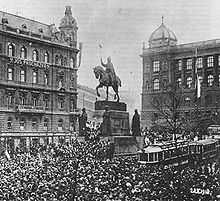Czechoslovak declaration of independence


The Czechoslovak Declaration of Independence or also the Declaration of Independence of Czechoslovakia , often also called the Washington Declaration (Czech: Washingtonská deklarace ), was drawn up on October 18, 1918 and came into force on October 28, 1918. As a result of the declaration, Czechoslovakia was founded and the Kingdom of Bohemia was officially dissolved on October 31, 1918 and incorporated into the new state with its provisional government.
background
In autumn 1918 the Austro-Hungarian monarchy was in a state of collapse due to the effects of the First World War . The US President Woodrow Wilson , who was a great supporter of a Czechoslovak state, called on the Czechoslovak people and their government to break away from the monarchy. On October 14, 1918, the Austro-Hungarian Foreign Minister, Baron István Burián von Rajecz, negotiated an armistice based on Wilson's 14-point program . Emperor Karl I reacted with the People's Manifesto of October 16, 1918, to prevent the dissolution of the monarchy, to change the structure of Cisleithania and to create a federation out of the Austrian monarchy. In order to prevent the secession of the areas striving for independence, the future status of the monarchy was negotiated in Trieste and a certain autonomy was promised for the area of Czechoslovakia. However, the Provisional Government of the Czechoslovak Republic met with the Allies during the same period. She had already started drafting the Declaration of Independence and finished this work on October 16. The document was written by Tomáš Garrigue Masaryk . On October 17th, Masaryk presented it to the US government. It was published in Paris on October 18, 1918 with Masaryk as the author. The US government accepted the declaration, but demanded a certain degree of autonomy for all nationalities represented in the state. After the defeat in the war immediately after the Italian offensive in the Battle of Vittorio Veneto on October 24th, a group of Czech politicians from the secret organization Maffie took over in Prague , later nicknamed " Men of October 28th " ("muži 28. října") were given command and declared Czechoslovakia independent on October 28, 1918. On October 30th, the Slovak population joined and declared themselves independent as part of the Czechoslovak state.
The explanation
Much of the declaration includes monologues directed against the Habsburgs and the nobility. The last part of the document describes the new state as a free and democratic republic in which there is freedom of religion, freedom of the press and an independent judiciary. The church should be separated from the state. Universal suffrage and equal rights for women should be introduced. The declaration also calls for a political parliamentarism dominated by Czechoslovakism. The national minorities should all be given the same rights and should not be economically or culturally oppressed.
Tomáš Garrigue Masaryk became the first Czechoslovak state president, Edvard Beneš became foreign minister and Milan Rastislav Štefánik became the first war minister of the new state, which is now designated by the constitution as Československá republika.
The signatories
- Tomáš Garrigue Masaryk
- Edvard Beneš
- Milan Rastislav Štefánik
consequences
After the declaration of independence, Czechoslovakia was recognized as a separate state by Great Britain , France and the United States on October 19, 1918. On October 31, the Kingdom of Bohemia was dissolved and incorporated into the new state. The Kingdom of Hungary led despite the bad situation to 1920 war against Czechoslovakia.
See also
literature
- Robert William Seton-Watson : A history of the Czechs and Slovaks. Hutchinson & Co., London 1943, Reprint, Archon Books 1965.
- Ca Watson - Hungary: A Brief History Edinburgh University Press, 1966
- Leo Valiani - the end of the Austro-Hungarian monarchy Secker & Warburg, 1973
- Declaration of independence of the Czechslovak Nation from the Provisional Government. New York. October 18, MDCCCCXVIII.
- "Hungarian Foreign Ministers from 1848 until today". MFA.gov.hu. Retrieved March 24, 2012.
- Kowtun, G.J (1985). The Czechoslovak Declaration of Independence: a History of the Document. Washington, DCS 46-8.
- Herbert Francis Sherwood. "A New Declaration of Independence". The outlook. 120 (base depot 1918). P. 406.
- Preclík, Vratislav. Masaryk a legie (TGM and legions), váz. kniha, 219 str., vydalo nakladatelství Paris Karviná, Žižkova 2379 (734 01 Karviná) ve spolupráci s Masarykovým Demokratickým hnutím (Masaryk democratic movement in Prague), 2019, ISBN 978-80-87173-47-3 , page 110 - 112, 128, 132

